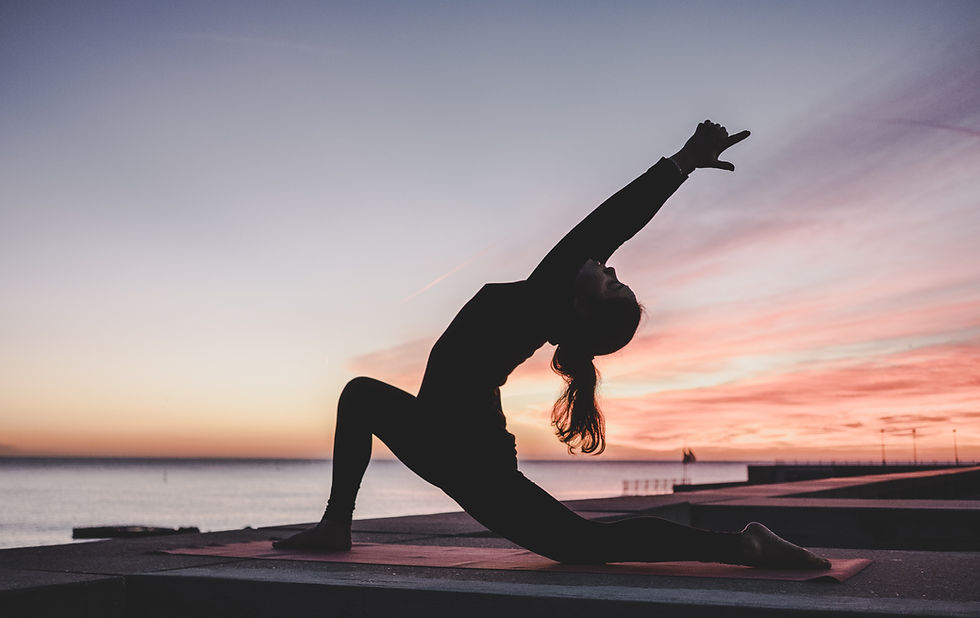Making connective tissue more flexible with Yin Yoga
- Jan 13, 2020
- 3 min read
Updated: Aug 2, 2021
Yin yoga is a gentle form of yoga in which the muscles are stretched but also the connective tissue is addressed. Connective tissue keeps the organs, muscles, and nerves in place and can become tighter when it is not being stretched. In fact you can compare it with an elastic band, which can be pulled out and easily springs back again. The more you stretch it, the more flexible your muscles and connective tissue become.
With Yin Yoga you hold most poses between 3 to 5 minutes and therefore you create a deep stretch in your muscles and connective tissue. It is important to breathe in and out deeply. With each exhalation you come a little further. After a while you notice that the different poses are easier to perform and that you slowly become more flexible.

What is connective tissue?
The connective tissue lies around your muscles. Connective tissue connects the skin with the muscles underneath. But it also attaches the muscles to the tendons, covers the blood vessels, and envelops the organs. In other words: connective tissue connects and cares for!
Connective tissue, on the other hand, is not as elastic as those muscles are. It is much stiffer and takes a while till it moves. That's the reason why you have to stretch and put pressure on it for a longer time.
If connective tissue remains hydrated, it also remains smooth. By letting go of the posture after a few minutes, the connective tissue at that particular spot is hydrated and more smooth. That's why it is possible that after holding a certain posture you literally feel something flowing in your body.
Energy flow
An increase in flexible connective tissue allows energy to flow again. Therefore, is it possible to feel a slight tingling sensation while holding each pose. When you come out of the pose you literally feel something flowing. This energy is your life-energy and is also called Qi or Chi. Deep-rooted emotions or traumas can also be released in several poses, especially in the pigeon pose.
The balance of Yin and Yang training
Yin and Yang keep each other in balance. Yin energy is related to the water element. It is receptive, liquid, flexible, deformable, and acceptable. Yin is expansive and all-encompassing. While yang energy makes us dynamic and alert, yin energy enables us to be relaxed, to "go with the flow" and to open ourselves to the constant change of life. Too much yin energy results in too much relaxation that we become lethargic, unmotivated, and both physically and mentally lazy. We can also become overly emotional and sensitive and finding it difficult to control our reactions.
Yang energy is related to the fire element and is an energy that is emitting, fast, dynamic, hot, dry, and restless. It is contracted and internalized. It is about direction, determination, setting and achieving goals, and the logical mind. It is the energy of vigilance and aspiration. To be in contact with yang energy is to be in contact with our ability to have full mental focus and the dynamic aspect of our being that wants to achieve goals. If this aspect is overemphasized, we can become intensely focused in one direction, but miss the broader perspective. There may be great trust in the mind, but a lack of trust in the heart. An excess of yang energy will result in insensitivity and loss of contact with our emotional selves, stiffness, and an inability to express ourselves freely.
That's why it is important to alternate yang training, such as lifting weights, many ball sports, body pump, or cycling with Yin Yoga. Therefore, the body will be much more balanced.
Yin Yoga at the end of the day
After each form of training I do a short Yin Yoga session in which I hold each pose for one minute. This is actually a slightly more extended version of stretching. I also do a Yin Yoga session with my boyfriend every evening. I hold each pose for 3 to 5 minutes. I really love this, because I provide peace in my body and mind. Plus I work on my flexibility every day, something I find very important.
To quickly get acquainted with Yin Yoga this is a very nice video. The different poses are only held for 1 minute, but you get a good impression of what Yin Yoga is.


Comments